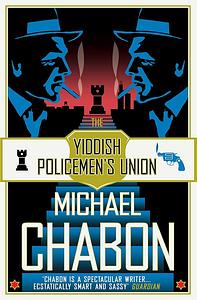Take a photo of a barcode or cover
funny
mysterious
medium-paced
Plot or Character Driven:
A mix
Strong character development:
Complicated
Loveable characters:
Yes
Diverse cast of characters:
Yes
Flaws of characters a main focus:
Yes
I definitely wanted to like the book more than I did. The idea and world building was interesting and the book tackles some very relevant themes but I found the prose overly… wordy? For lack of a better term and the plot hard to follow at times, and there were times were I felt like the solutions to the situations the main character was in came out of nowhere.
dark
reflective
medium-paced
Plot was all right; I love the prose. And the yiddish. Yiddish is fun.
Ufff... The book "universum", the very concept of this alternative history, are simply terrific. But the writing is certainly no match for them. Don't like that style, can't enjoy the story. Even Nabokov, as the last hope, the very last resort - doesn't help.
I wonder if MCh ever read anything by the greatest Yiddish classics - a synonym (for myself) of precision and accuracy, and of artistry, and virtuosity ... but not for the their sake.
I wonder if MCh ever read anything by the greatest Yiddish classics - a synonym (for myself) of precision and accuracy, and of artistry, and virtuosity ... but not for the their sake.
A real page-turner. I'm not usually into detective novels, but this one's insane-o premise and characters made it work.
Alt-history, hard boiled, detective mystery mashup.
My audio edition was 12 1/2 hours long. A dead tree copy would be about 430 pages. The original US copyright was 2007.
Full disclosure, I am a fan of the author. I have read almost all of his books. I have also read this book once, when it was first published.
Firstly, you need to be fan of [a:Raymond Chandler|1377|Raymond Chandler|https://images.gr-assets.com/authors/1206535318p2/1377.jpg] to appreciate this book. The author is, and so am I. He tries very hard to channel Chandler in this novel, and succeeds.
Secondly, you need to have some appreciation for Jewish culture to get many of the things going on in the story. The author is a Jew. While not being a Jew, I have Jewish friends. I’ve also worked in Israel, and in Metro-New York. In New York, I lived in close proximity to a Jewish neighborhood. For example, eastern European Jews, very much have a food culture. The descriptions of the food in the story made me hungry for a Knish. You develop an ear and a taste for Jewish culture.
I greatly enjoyed this book for the writing. I would call this a literary, hard-boiled, alt-history mashup. Chabon's erudite, witty and ironic. In several places I laughed out loud at the narration. I particularly found his use of Yiddish in the dialog to be almost a constant source of amusement.
One of Chabon’s greatest accomplishments was going against the hard boiled trope of the: tough, cynical, guy with a gun, a badge and street smarts, solving a mystery through dogged persistence, rather than insight. In this story the protagonist, Meyer Landsman was a mensch. Meyer conformed to many of the patterns attributed to Jews, and never found in Phillip Marlow. For example, Meyer was plagued by guilt. Also, Meyer had a lot of insight.
Chabon also knew how to keep the alt-history aspect of the story in the background. Too many alt-history, science fiction stories are the world building. Here, the alt-history was almost incidental. Except for the necessary American influence on the story, it might have been set in Tel Aviv.
Where I was disappointed was the use of the 3rd person POV, vs. Chandler’s characteristic first person.
I have a fetish for Chandler-esque hardboiled. I also have a familiarity with Jews and Jewish culture. This book was a fine example of an unlikely combination of ideas. Despite having read this book before, I think I enjoyed listening to it more. The Yiddish schtick of the dialog was much more entertaining to hear, then it was to read.
I’m looking forward to reading Chabon’s [b:Telegraph Avenue|10756240|Telegraph Avenue|Michael Chabon|https://i.gr-assets.com/images/S/compressed.photo.goodreads.com/books/1335716595l/10756240._SY75_.jpg|15667548] shortly.
My audio edition was 12 1/2 hours long. A dead tree copy would be about 430 pages. The original US copyright was 2007.
Full disclosure, I am a fan of the author. I have read almost all of his books. I have also read this book once, when it was first published.
Firstly, you need to be fan of [a:Raymond Chandler|1377|Raymond Chandler|https://images.gr-assets.com/authors/1206535318p2/1377.jpg] to appreciate this book. The author is, and so am I. He tries very hard to channel Chandler in this novel, and succeeds.
Secondly, you need to have some appreciation for Jewish culture to get many of the things going on in the story. The author is a Jew. While not being a Jew, I have Jewish friends. I’ve also worked in Israel, and in Metro-New York. In New York, I lived in close proximity to a Jewish neighborhood. For example, eastern European Jews, very much have a food culture. The descriptions of the food in the story made me hungry for a Knish. You develop an ear and a taste for Jewish culture.
I greatly enjoyed this book for the writing. I would call this a literary, hard-boiled, alt-history mashup. Chabon's erudite, witty and ironic. In several places I laughed out loud at the narration. I particularly found his use of Yiddish in the dialog to be almost a constant source of amusement.
One of Chabon’s greatest accomplishments was going against the hard boiled trope of the: tough, cynical, guy with a gun, a badge and street smarts, solving a mystery through dogged persistence, rather than insight. In this story the protagonist, Meyer Landsman was a mensch. Meyer conformed to many of the patterns attributed to Jews, and never found in Phillip Marlow. For example, Meyer was plagued by guilt. Also, Meyer had a lot of insight.
Chabon also knew how to keep the alt-history aspect of the story in the background. Too many alt-history, science fiction stories are the world building. Here, the alt-history was almost incidental. Except for the necessary American influence on the story, it might have been set in Tel Aviv.
Where I was disappointed was the use of the 3rd person POV, vs. Chandler’s characteristic first person.
I have a fetish for Chandler-esque hardboiled. I also have a familiarity with Jews and Jewish culture. This book was a fine example of an unlikely combination of ideas. Despite having read this book before, I think I enjoyed listening to it more. The Yiddish schtick of the dialog was much more entertaining to hear, then it was to read.
I’m looking forward to reading Chabon’s [b:Telegraph Avenue|10756240|Telegraph Avenue|Michael Chabon|https://i.gr-assets.com/images/S/compressed.photo.goodreads.com/books/1335716595l/10756240._SY75_.jpg|15667548] shortly.
I am not in love with this book as a whole, but did like the middle. The main characters were interesting and I enjoyed learning to like them. It's one quirky & surreal murder mystery. Take along a Yiddish dictionary if you are not fluent.
The book has an insane setup - a modern Yiddish colony of Sitka in Alaska. A divorced policeman is investigating a murder. He enlists the help of a filipino donut cook, a half native jewish wannabe cop, a yiddish boundary maven and many more. The book is hilarious. It starts of great, but it loses the plot midway, almost as if if Chabon cannot keep up with this ridiculous world. The book gets weary and you start realize there is not a lot of plot but just a lot of Byzantine style and setup.
3.5 stars
I love the writing, but I lost the plot thread somewhere.
I love the writing, but I lost the plot thread somewhere.



